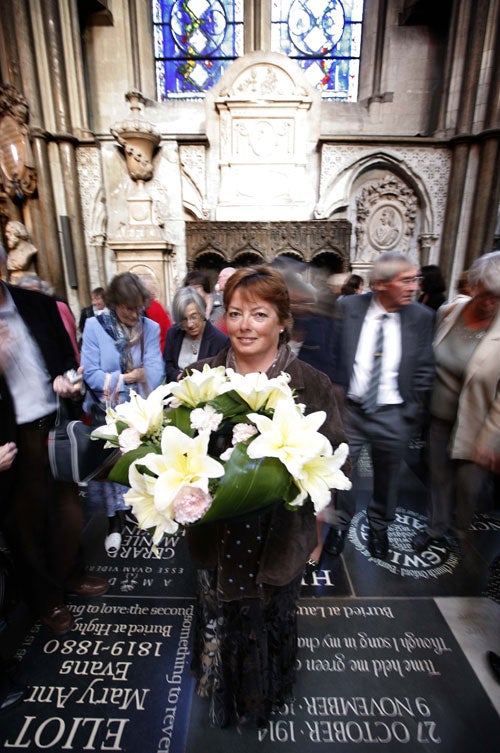Elizabeth Gaskell joins the greats in Poets' Corner
Westminster Abbey commemorates the 'Cranford' author and biographer days before the bicentenary of her birth

Your support helps us to tell the story
From reproductive rights to climate change to Big Tech, The Independent is on the ground when the story is developing. Whether it's investigating the financials of Elon Musk's pro-Trump PAC or producing our latest documentary, 'The A Word', which shines a light on the American women fighting for reproductive rights, we know how important it is to parse out the facts from the messaging.
At such a critical moment in US history, we need reporters on the ground. Your donation allows us to keep sending journalists to speak to both sides of the story.
The Independent is trusted by Americans across the entire political spectrum. And unlike many other quality news outlets, we choose not to lock Americans out of our reporting and analysis with paywalls. We believe quality journalism should be available to everyone, paid for by those who can afford it.
Your support makes all the difference.She is one of Britain's best-loved writers but has not been accorded her place in the pantheon, until now. The status of Elizabeth Gaskell, author of Cranford, as a national treasure was confirmed yesterday as she took her place alongside the literary greats in Westminster Abbey.
The Victorian novelist and biographer, who has enjoyed a resurgence in popularity in recent years thanks to successful BBC adaptations of her work, joined the ranks of illustrious authors, playwrights and poets in Poets' Corner four days before the bicentenary of her birth.
About 200 people, including her descendants and members of the Gaskell Society, a charity promoting the writer, attended a dedication conducted by the Dean of Westminster, the Very Reverend Dr John Hall. Some fans travelled from America and Japan for the service.
The dean, who decides who can be buried or memorialised in the abbey, dedicated a stained-glass panel in a window originally unveiled as a memorial to the architectural historian Edward Horton Hubbard in 1994.
Sarah Prince, Gaskell's great- great- great granddaughter laid a wreath under the window and said it was "marvellous" to see her ancestor memorialised. "I think the number of people here and the many enthusiasts is a testament to her continuing popularity," she added.
Gaskell Biographer Jenny Uglow said her Unitarian faith made her feel that the wrongs of the world should be righted. "She was a natural storyteller, enjoying gossip among friends, listening carefully to local tales. She was also observant, shrewd and sympathetic."
The dean said: "On balance, I decided that Elizabeth Gaskell's social perspective was still valuable and that her contribution to literature would endure," said the dean. "Honouring her in a window in Poets' Corner is a little like an earthly version of beatification: you hope people will be encouraged by her heroic example."
Alan Shelston, whose biography of Gaskell is published in November, said she would have been "honoured and amused" by the attention. "The interesting thing about Elizabeth Gaskell among the Victorian novelists is her range," he added. "In the past, her novels have been underestimated, perhaps because particular works [Cranford and Mary Barton] became popular at the expense of others."
Born Elizabeth Cleghorn Stevenson in London in 1810, the author spent most of her childhood in the Cheshire town of Knutsford, the inspiration for the fictional hub of Cranford.
Join our commenting forum
Join thought-provoking conversations, follow other Independent readers and see their replies
Comments